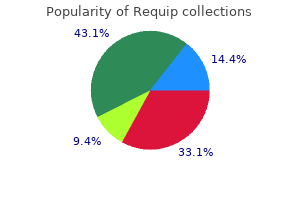Requip
"Purchase requip 2 mg visa, medicine 369".
By: R. Zapotek, M.B.A., M.D.
Deputy Director, University of Louisville School of Medicine
Making Connections: Sociological Research Being Male treatment uterine fibroids purchase 2 mg requip overnight delivery, Being Female symptoms kidney stones generic 0.25 mg requip mastercard, and Being Healthy In 1971, Broverman and Broverman conducted a groundbreaking study on the traits mental health workers ascribed to males and females. When asked to name the characteristics of a female, the list featured words such as unaggressive, gentle, emotional, tactful, less logical, not ambitious, dependent, passive, and neat. The list of male characteristics featured words such as aggressive, rough, unemotional, blunt, logical, direct, active, and sloppy (Seem and Clark 2006). Later, when asked to describe the characteristics of a healthy person (not gender specific), the list was nearly identical to that of a male. This study uncovered the general assumption that being female is associated with being somewhat unhealthy or not of sound mind. This concept seems extremely dated, but in 2006, Seem and Clark replicated the study and found similar results. Again, the characteristics associated with a healthy male were very similar to that of a healthy (genderless) adult. The list of characteristics associated with being female broadened somewhat but did not show significant change from the original study (Seem and Clark 2006). This interpretation of feminine characteristic may help us one day better understand gender disparities in certain illnesses, such as why one in eight women can be expected to develop clinical depression in her lifetime (National Institute of Mental Health 1999). Studying sexual attitudes and practices is a particularly interesting field of sociology because sexual behavior is a cultural universal. Throughout time and place, the vast majority of human beings have participated in sexual relationships (Broude 2003). Each society, however, interprets sexuality and sexual activity in different ways. Many societies around the world have different attitudes about premarital sex, the age of sexual consent, homosexuality, masturbation, and other sexual behaviors (Widmer, Treas, and Newcomb 1998). At the same time, sociologists have learned that certain norms are shared among most societies. The incest taboo is present in every society, though which relative is deemed unacceptable for sex varies widely from culture to culture. For example, sometimes the relatives of the father are considered acceptable sexual partners for a woman while the relatives of the mother are not. Likewise, societies generally have norms that reinforce their accepted social system of sexuality. What is considered "normal" in terms of sexual behavior is based on the mores and values of the society. Individuals are socialized to sexual attitudes by their family, education system, peers, media, and religion. Historically, religion has been the greatest influence on sexual behavior in most societies, but in more recent years, peers and the media have emerged as two of the strongest influences, particularly among U. Let us take a closer look at sexual attitudes in the United States and around the world. Sexuality around the World Cross-national research on sexual attitudes in industrialized nations reveals that normative standards differ across the world. For example, several studies have shown that Scandinavian students are more tolerant of premarital sex than are U. A study of 37 countries reported that non-Western societies-like China, Iran, and India-valued chastity highly in a potential mate, while Western European countries-such as France, the Netherlands, and Sweden-placed little value on prior sexual experiences (Buss 1989). For example, according to a 33,590-person survey across 24 countries, 89 percent of Swedes responded that there is nothing wrong with premarital sex, while only 42 percent of Irish responded this way. From the same study, 93 percent of Filipinos responded that sex before age 16 is always wrong or almost always wrong, while only 75 percent of Russians responded this way (Widmer, Treas, and Newcomb 1998). For instance, 45 percent of Spaniards responded that homosexuality is always wrong, while 42 percent responded that it is never wrong; only 13 percent responded somewhere in the middle (Widmer, Treas, and Newcomb 1998). Of industrialized nations, Sweden is thought to be the most liberal when it comes to attitudes about sex, including sexual practices and sexual openness.



Reviewers: Lorraine Bahrick treatment broken toe requip 1 mg with visa, Cara Cashon symptoms schizophrenia order line requip, Matt Dye, Christa Einspieler, Ross Flom, Regina Harbourne, Emily Hopkins, Lana Karasik, David J. Lewkowicz, Jacqueline Leybaert, Jeffrey Lockman, Margaret Moulson, Caterina Pesce, Gudrun Schwarzer, Naiqi Xiao. Reviewers: Kunlakarn Apiwattanalunggarn, Sonia Cabell, Elise Cappella, Anne Cash, Amy Cordier, Timothy W. Curby, Radosveta Dimitrova, Hope Gerde, Paulo Graziano, Jessica Harding, Bridget Ellen Hatfield, Manuela Jimenez, Tia Kim, Lisa Knoche, Lene Lindberg, Patti Manz, Anilena Mejia, Rena Menke, Laura Nathans, Ty Partridge, Irina Patwardhan, Roger David Phillips, Cynthia Rohrbeck, Raziye Salari, Belinda Sims, Allison Wallin, Shannon Wanless and Ashley Shafer, Xiaoli Wen, Rita Yelverton. Reviewers: Riana Elyse Anderson, Meeta Banerjee, Oscar Barbarin, Kalina Brabeck, Saskias Casanova, Jose M. Causadias, Zeynep Cemalciler, Gabriela Chavira, Brian Collins, Dylan Conger, Rosalie Corona, Danielle Crosby, Melissa Delgado, Sharon Ghazarian, Melinda GonzalesBacken, Taveeshi Gupta, Virginia Huynh, C. Hoffman, Susie Lamborn, Jacqueline Nguyen, Natalia Palacios, Scottie Plunkett, Lauren Rogers-Sirin, Patrice Ryce, Sukhmani Singh, Gabriela Stein, Diane Sunar, Andrew Supple, Sandra Tang, Rosa Irene Toro, Vanessa Volpe, Theodore Walls, Rebecca M. Berghout Austin and Brionne Neilson, Meryl Yoches Barofsky, Mary Bratsch-Hines, Elizabeth Pungello Bruno, Sarah Caverly, Lydia DeFlorio and Amber Beliakoff, Angela Gialamas, Yeh Hsueh and Hui Zhang, Jason Hustedt, Patricia Kitsao-Wekulo, Christine Lippard, Rebecca A. Reviewers: Rebecca Bigler, Jennifer Hoenig, Eva Lefkowitz and Rose Wesche, Meagan M. Patterson, Rachel Pauletti, Jessica Siebenbruner, Olivenne Skinner, Sara Vasilenko, Ryan Watson. Butler, Nadia Chernyak, Kathleen Helen Corriveau, Rory Thomas Devine, Xiao Pan Ding, Kenneth A. Dodge, Kristen Dunfield, Jan Engelmann, Angela Evans, Emma Flynn, Zijing He, Laura Hennefield, Sarah Jessen, Sheila Krogh-Jespersen, Kristin Leimgruber, Alan Miller Leslie and Michelle Cheng, Zoe Liberman, Tara Marissa Mandalaywala, Lori Markson and Hyesung Hwang, Alia Martin, Allison Master, Katherine McAuliffe, Candice Mills, Erika Nurmsoo, Carolyn Palmquist and Marissa Britt Drell, Patrick Pieng, Bradford Pillow, Lindsey Powell, Nadja Richter, Alexandra Rosati, Ted Ruffman, Rose Scott, Ameneh Shahaeian, Sarah Shultz, Elizabeth Ann Simpson, Virginia Slaughter, Debora de Hollanda Souza, Eva Telzer, Jennifer Wagner, Zhidan Wang, Katherine Rice Warnell, Fan Yang and Cai Guo, Min Hooi Yong. Reviewers: Daphna Bassok, Kimberly Boller, Erin Bumgarner, Sarah Font, Rachel Gordon, Heather D. Hill, Caitlin McPherran Lombardi, Lenna Nepomnyaschy, Matthew Stagner, Elizabeth Votruba-Drzal, Xiaohan Zhang, Kathleen M. Reviewers: Joseph Allen, Steven Asher and Paula Yust, Catherine Bagwell, Elliott Beaton, Lucy Betts, Julie C. Day, Nancy Deutsch, Amanda Duffy, Cynthia Anne Erdley, Candice Feiring, Sally Fitzpatrick, Claire F. Hoglund, Lauri Jensen-Campbell and Erin Boyd, Tina Kretschmer, Michele Lease, Amber Letcher, Yan Li and Yunyi Long, Kristina McDonald, Melissa Menzer, Diana J. Reavis, Lisa Rosen, Kenneth Rubin, Marie-Claude Salvas, Jennifer Samson, Michael Joseph Sheehan, Cara Simone Swit, Wendy Troop-Gordon, Lauren Usher, Jennifer Vu, Melissa Witkow, Michelle Wright, Lynne Zarbatany, Melanie Zimmer-Gembeck. Reviewers: Jason Baker, Julie Braungart-Rieker, Holly Brophy-Herb, Kristin Buss, Susan Calkins, Linda Camras, Pamela M. Fuligni, Amy Gentzler, John Haltigan, Leah Hibel, Deborah Laible, Elizabeth Lemerise, Diane M. Lickenbrock, Alexandra Main and Carmen Kho, Nicole Martin, Jennifer Martin McDermott, Nancy McElwain and Niyantri Ravindran, Judi Mesman, Adriana Molitor, Ginger Moore, Amanda Sheffield Morris, Emily Newton, Koraly Perez-Edgar and Santiago Morales, Carisa PerryParrish, Elizabeth Planalp, Seth Pollak, Betty Repacholi, Amy Root and Katie Elizabeth Rasmussen, Abby Christine Winer Schachner, Jennifer Silvers, Tracy Spinrad, Cynthia Stifter, Kali Trzesniewski, Amy Van Hecke, Eric A. Reviewers: Adriana Bus, Sandra Calvert, Jason Chein, Sarah Coyne, Laura Di Giunta, Samuel E. Ehrenreich, Guadalupe Espinoza, Rachel Flynn, Kara Garrity Liebeskind, Isabella Granic, Skyler Hawk, Amy Jordan, Janna Kim, Adriana Manago, Amy Nathanson, Mariya Nikolayev, Claudia Pineda, Joy Piontak, Jenny Radesky, Fernando Rodriguez, Michael Arthur Russell, Barbara W. Sarnecka, Kaveri Subrahmanyam, Dallas Swendeman, Rosemarie Truglio, Yalda Uhls, Marion K. Registration: $65 for Students/Early Career Members/Nonmembers; $110 for Regular/Emeritus Members/Nonmembers Note: Register online when purchasing conference registration. Wednesday, 4:00pm-6:30pm (Event P-002) Pre-Conference Event Meeting Room 406 (Hilton Austin) Wednesday, 4:00pm-6:30pm P-002. Registration: $45 for Regular/Emeritus Members/Nonmembers; $25 for Student and Early Career Members/Nonmembers. Thursday, 9:45am-11:00am (Event 1-003) Poster Session Exhibit Hall 4 (Austin Convention Center) Thursday, 9:45am-11:00am 1-003. Poster Session 1 Attention, Learning, Memory 1 Assessing the Cost of Competing Stimulation on Attention to Multimodal Events: Longitudinal Findings from 3 to 12 months James Torrence Todd, Myriah McNew, Kasey Soska, Lorraine Bahrick Tests of Longitudinal, Bidirectional Associations Between Attention Problems, Smoking, and Grades in Adolescents Christopher Price Withers, David W Sosnowski, Wendy Kliewer the developmental trajectory of responding to conflicting gaze and language cues Ryan A. Brown, Koraly Perez-Edgar Executive Function in Children Born Very Preterm: the Moderating Role of Parenting Bharathi Jayanthi Zvara, Sarah A Keim, Kelly McNamara, Sarah E Anderson Examining the Relation between Executive Function, the Student-Teacher Relationship, and Problem Behaviors in Early Childhood Courtney Boise, Lisa Knoche, Susan M.

The remaining 13 articles 9 medications that can cause heartburn cheap requip 2 mg fast delivery, reviewed in their entirety red carpet treatment generic 2 mg requip visa, and 9 publications for excluded for the following reasons: 3 were not in English, 3 related to aseptic loosening (not infection), 1 did not involve the use of special stains and 2 had an inappropriate study design. Quantification of neutrophil polymorphs in infected and noninfected second-stage revision hip arthroplasties. Publications that did not relate to the topic, case reports and those describing technical details of revision arthroplasty were all excluded. Across the studies which met the criteria, two that stated multiple tissue samples were taken and were recorded as at least two samples (due to lack of clarity on the number). The number of cultures obtained and sent were reported as the mean of the minimum number of cultures sent, as reported in the studies. Separate estimates were obtained for studies reporting < 3 cultures and those reporting 3 cultures. The reviewed literature revealed that the mean number of culture samples taken across cohorts included in the studies was four (minimum two, maximum eight). The analysis indicated that taking three or more intraoperative samples yielded higher negative predictive value to rule out infection without limiting the positive predictive value to confirm infection (Table 1). It is for this reason that we suggest that intraoperative samples be sent for all revision hip and knee arthroplasties, irrespective of preoperative diagnosis. Cases are revised for a variety of reasons, and making a preoperative diagnosis may be challenging [1]. There is also a paucity of available standards on how many intraoperative cultures should be taken. Attempts to standardize these practices have been published in the form of treatment guidelines, yet the approach still varies between practitioners and locations. This is in part owing to a paucity of strong evidence to support specific guidelines [4]. Some studies reported on their results when taking five to six intraoperative tissue samples from multiple areas of the infected prosthesis and hip joint including the capsule, pericapsular tissue and membrane around prosthesis. Our present review of the literature shows an average of four tissue samples being taken across the studies which we examined. There are obvious discrepancies and variations in the protocols and guidelines being adhered to which may vary according to institution. Although a combination of preoperative investigations can point towards infection, no test has yet proved to be completely accurate as a stand-alone test [9]. Therefore due to low sensitivity of intraoperative cultures [10], it is only imperative that definite guidelines on how many samples to be taken should be anchored on evidence based literature. In the current body of published studies, there are no randomized controlled studies answering this specific question. The unsuspected prosthetic joint infection: incidence and consequences of positive intra-operative cultures in presumed aseptic knee and hip revisions. Factors associated with choice and success of one- versus two-stage revision arthroplasty for infected hip and knee prostheses. High failure rates in treatment of streptococcal periprosthetic joint infection: results from a seven-year retrospective cohort study. Role of frozen section histology in diagnosis of infection during revision arthroplasty. Efficacy of intraoperative cultures obtained during revision total hip arthroplasty. A positive bacterial culture during re-implantation is associated with a poor outcome in two-stage exchange arthroplasty for deep infection. The collection of multiple intraoperative tissue samples is considered by many experts to provide the highest yield in isolating organisms from a joint. Due to inherent methodologic difficulties and limitations in the existing literature and variation in culture techniques between institutions, it is not possible to make a general statement regarding the relative yields of synovial fluid and tissue culture.

Syndromes
- Symptoms of childhood-onset or type 2 diabetes
- Blood clot in an artery or vein
- Poor social skills
- Narrow chest
- Regular (nondiet) carbonated beverages, such as soda
- Allergy to contrast dye

Resocialization is necessary when a person moves to a senior care center withdrawal symptoms discount requip, goes to boarding school medications look up effective requip 0.5mg, or serves time in jail. The process of resocialization is typically more stressful than normal socialization because people have to unlearn behaviors that have become customary to them. A ship at sea is a total institution, as are religious convents, prisons, or some cult organizations. First, members entering an institution must leave behind their old identity through what is known as a degradation ceremony. In a degradation ceremony, new members lose the aspects of their old identity and are given new identities. To enter a senior care home, an elderly person often must leave a family home and give up many belongings which were part of his or her long-standing identity. Though caretakers guide the elderly compassionately, the process can still be one of loss. In many cults, this process is also gentle and happens in an environment of support and caring. New prisoners lose freedom, rights (including the right to privacy), and personal belongings. These individuals must give up any markers of their former identity in order to be resocialized into an identity as a "soldier. Air Force/Wikimedia Commons) After new members of an institution are stripped of their old identity, they build a new one that matches the new society. In the military, soldiers go through basic training together, where they learn new rules and bond with one another. Soldiers must keep their areas clean for inspection, learn to march in correct formations, and salute when in the presence of superiors. Learning to deal with life after having lived in a total institution requires yet another process of resocialization. They set aside personal goals to achieve a mission, and they take pride in the accomplishments of their units. Many soldiers who leave the military transition these skills into excellent careers. Others find themselves lost upon leaving, uncertain about the outside world and what to do next. Charles Cooley and George Mead both contributed significantly to the sociological understanding of the development of self. Lawrence Kohlberg and Carol Gilligan developed their ideas further and researched how our sense of morality develops. Research demonstrates that who we are is affected by both nature (our genetic and hormonal makeup) and nurture (the social environment in which we are raised). Schools, workplaces, and the media communicate and reinforce cultural norms and values. Resocialization is a process that removes the socialization we have developed over time and replaces it with newly learned rules and roles. Because it involves removing old habits that have been built up, resocialization can be a stressful and difficult process. Psychologists are interested in mental health, while sociologists are interested in societal functions. Why do sociologists need to be careful when drawing conclusions from twin studies Why are wealthy parents more likely than poor parents to socialize their children toward creativity and problem solving Wealthy parents are socializing their children toward the skills of white-collar employment. Wealthy parents are not concerned about their children rebelling against their rules. Which of the following is not an age-related transition point when Americans must be socialized to new roles They are expected to enter college, trade school, or the workforce shortly after graduation. What types of questions would the sociologist ask, and what research methods might he employ
Purchase line requip. What is Causing Parkinson's Symptoms?.

